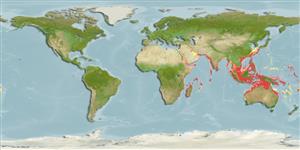Ελασμοβράγχιοι (καρχαρίες και σαλάχια) (sharks and rays) >
Carcharhiniformes (Ground sharks) >
Carcharhinidae (Requiem sharks)
Etymology: Loxodon: loxos (Gr.), slanting; odon (Gr.), tooth, probably referring to oblique teeth cusps [name first published with no included species; species added by Müller & Henle in 1839] (See ETYFish); macrorhinus: macro-, from makros (Gr.), long; rhinos (Gr.), nose, probably referring to its long, narrow snout (See ETYFish).
More on authors: Müller & Henle.
Environment: milieu / climate zone / depth range / distribution range
Οικολογία
Θαλασσινό(ά) βενθικό(ς); εύρος βάθους 7 - 100 m (Ref. 6871). Tropical; 34°N - 30°S
Indo-West Pacific: Red Sea and East Africa to Indonesia, north to Japan, south to Australia.
Length at first maturity / Μέγεθος / Βάρος / Age
Maturity: Lm 85.0, range 79 - 90 cm
Max length : 98.0 cm TL αρσενικό/απροσδιόριστο; (Ref. 58048)
Ραχιαίες άκανθες (συνολικά) : 0; Εδρικές άκανθες: 0. A small, very slim shark with a long, narrow snout, big eyes with rear notches, short labial furrows, and small, oblique-cusped teeth with smooth edges; 2nd dorsal fin small, low and behind larger anal fin; interdorsal ridge rudimentary or absent (Ref. 5578). Grey above, pale below, fins with pale edges (transparent in life), caudal and first dorsal fins with narrow dark margin, first dorsal fin also with a dusky tip (Ref. 9997).
Found on continental and insular shelves; mainly near the bottom (Ref. 6871). Feeds on small bony fishes, shrimps and cuttlefish (Ref. 244). Viviparous (Ref. 50449); gives birth annually to litters of 2-4 pups (Ref.58048). Caught in artisanal and small scale commercial fisheries (Ref. 9997). Utilized fresh for human consumption (Ref. 244); meat and fins, but of limited value due to its small size (Ref.58048).
Viviparous, with a yolk-sac placenta; 2-4 pups per litter. Size at birth 40-43 cm; 54-55 cm TL (Ref.58048). Distinct pairing with embrace (Ref. 205).
Compagno, L.J.V., 1984. FAO Species Catalogue. Vol. 4. Sharks of the world. An annotated and illustrated catalogue of shark species known to date. Part 2 - Carcharhiniformes. FAO Fish. Synop. 125(4/2):251-655. Rome: FAO. (Ref. 244)
IUCN Red List Status (Ref. 130435: Version 2024-1)
Human uses
αλιεία: Εμπορικό(ά); αλιεία αναψυχής: ναί
Εργαλεία
Special reports
Download XML
Διαδικτυακές πηγές
Estimates based on models
Preferred temperature (Ref.
123201): 24.6 - 29, mean 28 °C (based on 1702 cells).
Phylogenetic diversity index (Ref.
82804): PD
50 = 1.0000 [Uniqueness, from 0.5 = low to 2.0 = high].
Bayesian length-weight: a=0.00490 (0.00229 - 0.01045), b=3.08 (2.91 - 3.25), in cm total length, based on LWR estimates for this (Sub)family-body shape (Ref.
93245).
Τροφικό Επίπεδο (Ref.
69278): 4.0 ±0.4 se; based on diet studies.
Generation time: 3.3 ( na - na) years. Estimated as median ln(3)/K based on 2
growth studies.
Ελαστικότητα (Ref.
120179): Πολύ χαμηλό, ελάχιστος χρόνος για διπλασιασμό πληθυσμού > 14 έτη (Fec=2).
Fishing Vulnerability (Ref.
59153): Moderate to high vulnerability (46 of 100).
